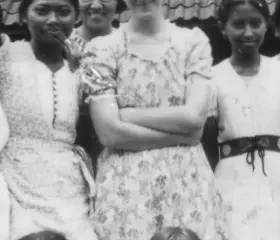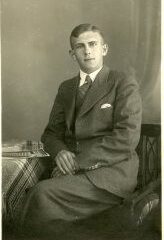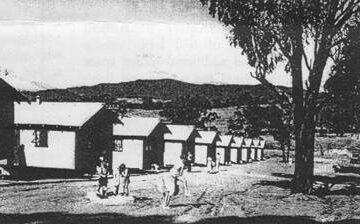Dutch Origins and Migration
The Witschge family is a notable Dutch-Australian football family that made its mark in Western Australia (WA). Theie eldest son Henry Witschge was born in Amsterdam and in 1954 his family emigrated to Australia. In WA, Henry became involved with the Windmills soccer club (later Morley-Windmills SC), a club founded by Dutch immigrants in 1950 and known for its Dutch heritage. As a former Windmills player, Henry continued his involvement in the sport beyond his playing days by becoming a referee. His officiating career reached the national stage – he served as a referee in Australia’s top-tier National Soccer League (NSL) matches. For example, Henry Witschge was the referee for the inaugural NSL Charity Shield match in 1981, and he also officiated high-profile NSL Cup fixtures in the late 1970 Henry’s dual contribution – first on the field with a club of his Dutch compatriots, and later as an NSL referee – laid the foundation for the family’s Australian football legacy.
(It should be noted that this Witschge family is unrelated to the famous Dutch international brothers Richard and Rob Witschge of AFC Ajax and the Netherlands national team. The Witschges in WA are a separate family sharing only the surname.)
Tony Witschge (1956–2020) – WA Goalkeeping Great

Henry’s younger brother Tony Witschge was born in Perth Western Australia and went on to become one of WA’s most celebrated goalkeepers. Tony came through the local ranks – he was a junior at Caledonian and began his senior career with Melville Alemannia in the early 1970. By 1975, he had moved to Ascot, and soon thereafter he joined Spearwood Dalmatinac, the club where he spent the prime of his career. Tony’s imposing presence and shot-stopping ability helped Spearwood Dalmatinac emerge as a powerhouse. In fact, when Spearwood won its first State League title in 1979, Tony Witschge was one of the standout players anchoring the team He later had brief stints with Kwinana United and East Fremantle Tricolore (joining the latter in 1985), but his name is most strongly linked with Spearwood’s golden era.

On the representative stage, Tony Witschge earned a reputation as one of WA’s greatest keepers. He made 35 appearances for the WA State team, debuting as a 19-year-old in the 1975 Marah Halim Cup in Indonesia. Notably, he was part of WA’s Marah Halim Cup triumphs in 1975 and 1976, an invitational tournament which WA won against international opposition. Tony’s most famous performance came in a 1975 friendly against Glasgow Rangers, where his heroics in goal secured WA’s shock 2–1 victory; contemporary reports noted he frustrated the Rangers attack “time and again” with his form between the posts. Over the years, he faced top clubs like Middlesbrough, Manchester United, Tottenham Hotspur, Sunderland, Red Star Belgrade and Norwich City when they toured Australia, underscoring his place among WA’s elite. Tony enjoyed considerable team success domestically as well – across twelve seasons in the WA State League he won three First Division (state league) championships, plus multiple cup titles (D’Orsogna Cup, Night Series, Top Four Cup) with his clubs. His excellence was formally recognized with induction into the Football Hall of Fame WA (Hall of Champions) in 2002.
After retiring, Tony remained a respected figure in the local football community. His sudden passing in June 2020, at age 64, was widely mourned. He is remembered as “one of Western Australia’s goalkeeping greats”, a player who carried his family’s Dutch football lineage into prominence in his birthplace of WA.
Robin Witschge – Stalwart Defender in WA
The third broether, Robin Witschge likewise grew up in Western Australia within this Dutch-Australian football family. A tall and commanding defender, Robin made his name in the same era as Tony, often alongside him. While Tony guarded the net, Robin was organizing the backline. He initially played at club level in WA and rose through the ranks in local football. By the late 1970s, Robin had become a key player for Spearwood Dalmatinac. In 1979, he captained Spearwood Dalmatinac to the State League title, the club’s historic first . Robin’s leadership and defensive prowess were integral to that success; contemporary accounts note that Spearwood’s well-disciplined 1979 side featured “brothers Tony and Robin Witschge” among its shining stars. That season, Spearwood not only topped the league but also claimed the Night Series pre-season cup, heralding a period of dominance in WA soccer.
Like his brother, Robin also earned state representative honors. He was selected for WA and played alongside Tony in high-profile exhibitions – for example, both Witschge brothers were in the WA lineup that faced English club Norwich City in 1979. Robin’s height and defensive skills complemented Tony’s goalkeeping in these matches. Though Robin may not have the same volume of individual accolades as his goalkeeper sibling, he was very much a player of note in his own right in the late 1970s. He remained a stalwart for Spearwood into the early 1980s, contributing to the club’s continued success (Spearwood would go on to win multiple trophies in the 1980s as well). Robin eventually retired from top-flight competition, but his role in that era’s triumphs secured his place in WA’s football heritage.
Family Connections and Legacy
The Witschge story in Australia is one of a family sustaining its football traditions across generations. Henry Witschge’s decision to migrate and involve himself in the local Dutch club set the stage. His sons, raised in WA but proud of their Dutch roots, became prominent footballers at state level. Henry’s background undoubtedly influenced Tony and Robin, who carried forward a love of the game and achieved success in Australia. The family’s Dutch heritage was a point of pride – for instance, the club where Henry and later Robin/Tony were associated (Morley Windmills) explicitly celebrates its Dutch origins.
In terms of timeline, Henry’s active years as a player would have likely been in the 1950s–1960s (during the Windmills’ early successes), transitioning into refereeing by the late 1960s. Indeed, records show “Henri Witschge” listed among WA referees in the 1969–1970 period. By the 1970s and early 1980s, Henry was officiating top-level games, even outside WA – for example, he famously halted and abandoned a violent NSW State League match in 1978 as the referee, demonstrating his senior status in Australian refereeing. Meanwhile, the 1970s were the heyday of Tony and Robin’s playing careers. Tony’s debut for WA came in 1975 and he starred throughout that decade, while Robin hit his peak around the 1979 season. Tony continued playing into the mid-1980s. Both brothers were part of WA’s state squads that achieved landmark results (such as the Rangers upset in 1975 and the back-to-back Marah Halim Cup wins. Robin’s last major honours with Spearwood came in the early 1980s, and Tony capped his state team career in 1982 with a final win over University College Dublin.
In summary, the Witschge family in Australia represents a continuum of football involvement: Henry Witschge provided the Dutch connection and served both on the pitch and as a referee, while Robin Witschge and Tony Witschge became fixtures of Western Australian football in the 1970s, each excelling in their roles (defender and goalkeeper, respectively). Their stories underscore the contribution of post-war European migrants to Australian soccer, especially in WA’s leagues. The Witschges are remembered fondly in the WA football community: Tony for his goalkeeping greatness and Hall of Fame career, and Robin for captaining a champion side and being part of a formidable sibling duo. Their Dutch heritage and family ties add a rich layer to their legacy, distinguishing them as a true heritage football family in Western Australia.
See also: Clogball


